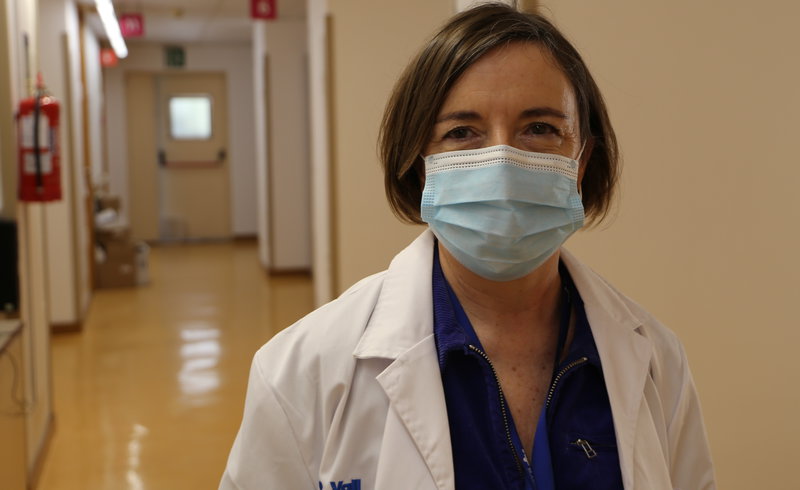Everyone knows someone who has an allergy. Are there many different types?
The ones we all think about are the immediate ones: someone who eats a nut and their face starts to swell and they get dizzy. There are also allergies with delayed reactions: for example, an allergy to the skin that occurs after wearing some type of metal, earrings, bracelets, and so on. These do not appear immediately, but after hours or days of contact with the object, and the most typical is nickel allergy. They are two different mechanisms, but both are considered allergies because in both cases they are the body’s immune response. Aside from this distinction, there are also food-type allergies, skin-only, respiratory and general allergies that involve many systems.
And is it true that there are more and more of them?
Yes, the prevalence of allergies in the general population continues to rise. There may have been a more pronounced increase a couple of years ago and now the curve is flattening out a bit, but it’s still growing. Part of this is probably due to people requesting more tests. But the statistics already take this bias into account and allergies are definitely on the rise.
What’s the explanation for this trend?
It’s thought to be related to the modern western lifestyle. Populations living in rural areas, which have a closer relationship with nature and more contact with microorganisms such as bacteria and fungi, appear to be more protected from developing allergies. On the other hand, more urban lifestyles, with better hygienic conditions, more cleanliness, more antibiotics... all these measures, which are very necessary because they prevent infections, favour there being more allergies.
So contact with microorganisms stimulates the immune system enough not to develop allergies?
That’s right – it’s a kind of training that the immune system needs to be able to develop normally. When this is not the case, you’re more likely to have allergies.
So this year of pandemic, where we have applied stricter and more consistent hygienic measures, will cause them to skyrocket?
I don’t think so, because these possible reactions of our immune system are not immediate, they are the result of alterations that probably occur over generations. We know that epigenetic changes [changes in the function of genes that are turned on or off without DNA modification] mean that our grandparents’ lifestyle – in fact, more our grandmothers’ – may have influenced our current immune response. So I don’t think this year with these different conditions will have a direct effect on allergies. What we have seen, for example, is that because we have been locked up at home for longer, more people have suffered from allergies to dust mites. There have also been more allergies to pets, precisely because of having longer contact with them. On the other hand, for those allergic to pollen, having to wear a mask has generally helped them, although there are always exceptions. The mask is one recommendation we often make, but many people were embarrassed to wear it before the pandemic. Coronavirus has helped in this regard.
Looking ahead to this year, do you know how allergies will go this spring?
The same thing happens every year, we try to make a forecast, but it’s very difficult. What has been most associated with high pollen seasons is high rainfall in previous months. This year is no exception, but we can’t know for sure.
Regarding the number of people who suffer from allergies, are there specific percentages?
It depends a lot on the type of population being studied, but it’s currently estimated that between 25% and 30% of people will have some type of allergy in their lifetime. It should be noted that no one is born allergic. It’s a condition that develops throughout your life, when you come into contact with different elements in your environment.
Are there people who have never been allergic to a particular substance and become so over time?
Yes, these cases can occur. To become allergic, you must have contact with the element that causes your allergy. I have patients who tell me, “I’ve been eating this food all my life and I’ve never had a reaction before!” But this is no guarantee. You actually must have been in contact with that food or product to eventually become allergic to it. Then there comes a time when you eat, breathe, or touch it, and the allergy symptoms show up. We can become allergic at any time in life. Respiratory and food allergies most typically begin in childhood or youth. But there is a small percentage of patients who start in adulthood.
Is there any advice for the general population to prevent allergies?
The truth is no. Attempts have been made by the medical world to take measures to prevent them from the moment of birth. Attempts have been made to modify the diet of pregnant women and attempts have been made to modify the introduction of foods by delaying some of them, to see if this has any effect. But in the end, what we’ve seen is that there’s no specific way to prevent an allergic person from becoming allergic.
The big question is: what is the trigger that causes allergies?
Yes, and we still don’t know the answer. We don’t know why there are people who have led completely normal lives and at some point are starting to be allergic to certain foods or substances. And yet another question: what are the conditions that make a person have a more severe or less severe allergic reaction? Yes, there are some associated factors... But often patients with the same characteristics express a very different intensity of reaction. This is an important field of interest.
interview health

